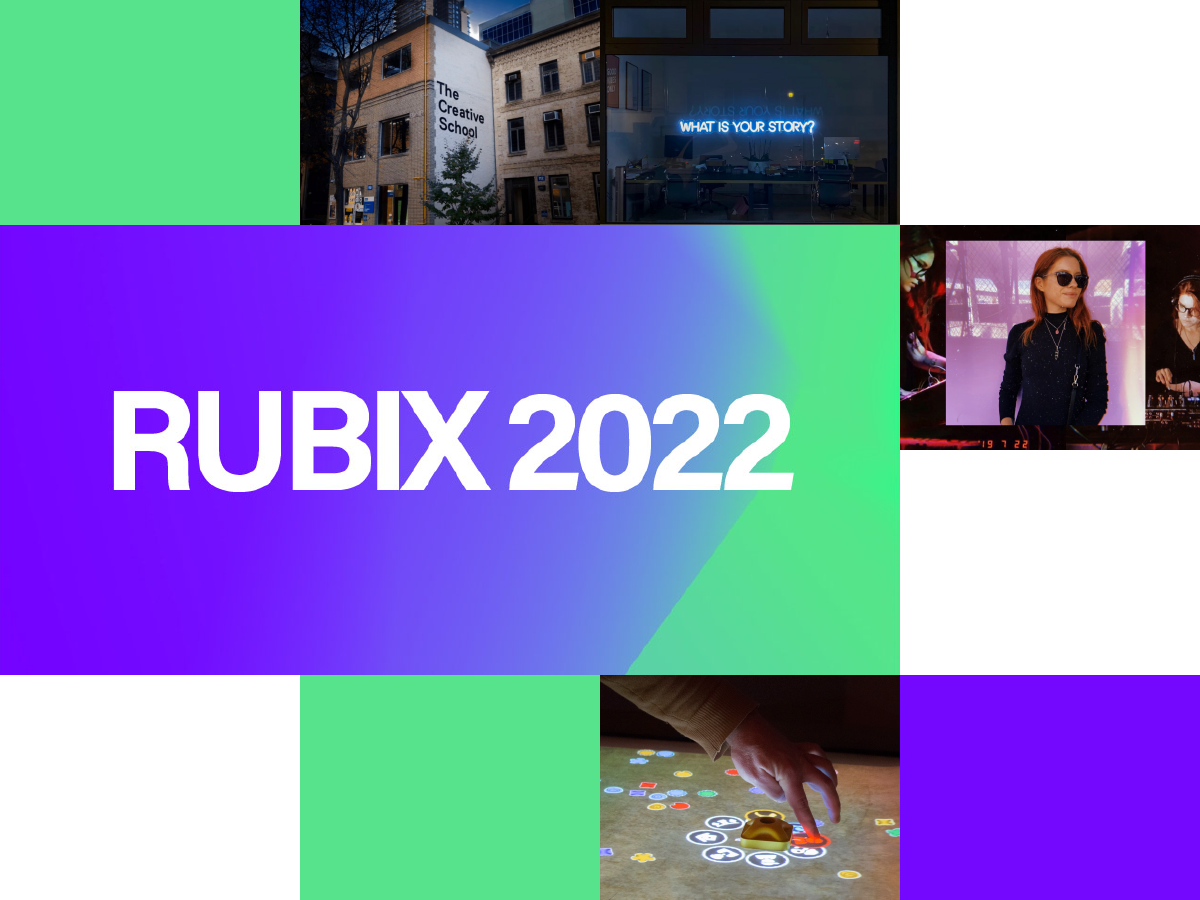Creativity and innovation on display at RUBIX 2022

The Creative School’s annual RUBIX event took place January 27, 2022.
With a goal of fostering trans-disciplinary collaborations and conversations, The Creative School’s annual event last month, RUBIX 2022, featured compelling demonstrations, conversations on the future of research and PechaKucha presentations.
During roundtable discussions, faculty engaged with each other and audience members, exchanging different perspectives and approaches to research questions and the future.
Showcasing the work of 54 participants from across the faculty, this year’s event was re-imagined in a new, live streaming format that offered a variety of opportunities to learn about scholarly, research and creative activities on topics ranging from creativity and artificial intelligence (AI), to fashion and sustainability, to a post-pandemic mobile gallery. In addition to the live event, there is an online digital exhibition to explore.
As part of his welcoming remarks, Ryerson’s vice-president, research and innovation, Steven N. Liss noted the variety of projects featured this year.
“I know that The Creative School continues to engage in pathbreaking trans-disciplinary research that maximizes the potential of creativity for transformational and disruptive innovation – an integral part of the university’s strategic research vision,” he said. “This continues to build Ryerson’s reputation for excellence worldwide.”
The Creative School’s Associate Dean Natalie Álvarez emphasized the aim of bringing together researchers at RUBIX to exchange ideas. “Our hope is that you discover surprising connections and shared interests that lead to future collaborations,” she said.
Dean Charles Falzon highlighted the potential of cross-disciplinary work, not only with colleagues from the university, but also partners around the world. “We’re reinventing and reclaiming creativity at The Creative School,” he said.
A trio of demos
Professors Kristopher Alexander, Amanda Cupido, Reem El Asaleh, Martin Habekost and Abhay Sharma participated in demonstrations during the afternoon.
- Professor Alexander presented a “micro-learning” session on applying video game research in education, including insights into his own experiences incorporating video games into his teaching to engage his students. “If we just say the word ‘video games’, we don’t often delve into the nuance of how powerful they can be,” he said.
- Can you improve colour reproduction in printing while reducing costs? Professor El Asaleh, on behalf of herself and professors Habekost and Sharma, presented on the process and outcomes from an ongoing project experimenting with expanding the colour gamut used for flexographic printing in the packaging industry to increase spot colour accuracy and production cost savings.
- Journalism professor Amanda Cupido shared her web-based podcasting app Remember This (external link, opens in new window) , which captures precious memories in an audio format. The two-step process starts with users recording their answers to a series of questions. Then, “The app mixes it with music and narration and spits out a slickly produced podcast with a click of a button,” said professor Cupido. Users can save the resulting audio privately or submit it to be shared with the podcast’s audience. To date, the app has attracted users from around the world, and there is potential to scale it in the future to possibly include different languages and questions.
PechaKucha 20x20
A special early evening session featured 14 presentations by researchers from The Creative School. Delivered in the “PechaKucha” (Japanese for “chit chat”) style, each presenter followed the same format: 20 slides, each lasting 20 seconds, for a total of 6 minutes 45 seconds. Some of the highlights from these dynamic presentations included the following:
- Diana Varma, a lecturer with the School of Graphic Communications Management, discussed her 17-part podcast series “Intersection”. The series brought together leading female visual artists from around the world for individual conversations that helped uncover larger shared ideas, themes and connections. “There are the individual stories and then the stories between stories,” she said.
- Ali Mazalek, professor and Canada Research Chair in Digital Media and Innovation, shared her ongoing research from the Synaesthetic Media Lab that explores how embodied interactions can support and enhance creativity, discovery and learning across the physical and digital worlds. “The projects … highlight the strong connection between our physical and sensory experiences on the one hand, and our ability to think and reason about the world on the other,” she explained.
- Sonya Fatah, a professor in the School of Journalism, discussed stiched!, her live journalism project, as well as the genesis of her upcoming show, “Bullied”. The community-led and solutions-based long-form story will be told on stage at Hamilton’s Theatre Aquarius on April 1, 2022. “[The show] takes audiences into the difficult world of childhood bullying and asks why strategies to target it aren’t working,” she explained.
- David Gauntlett, Canada Research Chair (Tier 1) in Creative Innovation and Leadership, and Valeria Duerte, a researcher and the project manager, spoke about their Reframing Creativity (external link, opens in new window) project. They investigated how artists around the world were impacted by the COVID-19 pandemic and how they adapted or pivoted their work in the face of this new reality. “It was striking to see that, regardless of the many obstacles they had to face, creators were able to navigate this moment and find various opportunities to thrive in it,” said Duarte.
Research discussions
Twenty faculty researchers participated in the roundtable sessions to explore future-forward research questions and perspectives on six themes: 1) the untapped potential of game design for creating more engaging and inclusive audience experiences; 2) decolonizing research methodologies; 3) creativity and AI; 4) sustainable design; 5) how a focus on justice, equity and inclusion is changing industry practices and aesthetic forms; and 6) the future of digital storytelling. Moderated by PhD candidates and fellow faculty members, the researchers engaged in discussion with each other and the audience.
Learn more about this year’s RUBIX exhibition.
Related links:
Esports and fashion take centre stage at RUBIX showcase launch (November, 2020)
Creative industry researchers reveal new work at fifth annual RUBIX showcase (November, 2019)